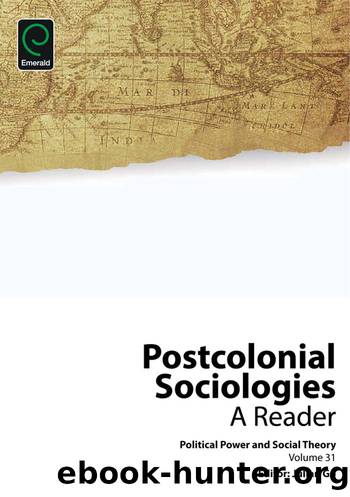Postcolonial Sociologies by Go Julian;

Author:Go, Julian;
Language: eng
Format: epub
Publisher: Emerald Publishing Limited
Published: 2016-08-22T00:00:00+00:00
EMBATTLED AUTONOMY, 1880â1945
Max Weber and Richard Thurnwald present two very different patterns of scientific autonomy and dependence. Weber (1964, 1920), was recognized as the leading German sociologist during his lifetime.23 The Max Weber âmythâ in Heidelberg in the decade before World War I rivaled that of his acquaintance, the poet Stefan George (Honigsheim, 1926; Norton, 2002, pp. 475â480; Radkau, 2009, pp. 293â297). At the meetings of the German Sociological Association between 1910 and 1933, no name was mentioned more frequently than Max Weberâs (Kaesler, 1984, p. 41). He was called the most important âmaker of sociologyâ by the other German sociologists interviewed by Earle Edward Eubank in 1934 (Kaesler, 1991). Sociologically, Weber exemplified the 19th century model of the German university professor, in which Besitz (economic capital) formed the precondition for Bildung or academic culture, and also allowed for considerable scientific autonomy. This was true for Weber at least after he married Marianne Schnitger (Roth, 2001, p. 549) and obtained his first professorship at Freiburg in 1894 (Weber, 1988, pp. 199â201). Before that time Weber was financially dependent on his father. Shortly after Weber received the status of Ordinarius (full professor) at Heidelberg in 1897 his father died in a series of events that triggered his nervous breakdown. His teaching and research came to a halt and he resigned his professorship in 1903, again becoming financially dependent, this time on his mother (Mitzman, 1985, pp. 148â153; Radkau, 2009, p. 282). In 1908, Marianne inherited a great deal of money (Radkau, 2009, pp. 280â283), easing the Webersâ financial condition. Weber had already started to reemerge with the publication of The Protestant Ethic and the Spirit of Capitalism in 1904â905, and he began to play a central role in the nascent German discipline of sociology and in academia and politics more generally, finally accepting a chair in economics at Vienna in 1919 and Lujo Brentanoâs chair at Munich in 1920, where he moved just before he died.
Weber attached central importance to autonomy. Much of his writing during the 1890s can be interpreted at least in part in the context of his obsession with his own and his motherâs autonomy from his overbearing, patriarchal father, Max Weber, Sr., and his desire to escape from âabject dependenceâ (Mitzman, 1985, pp. 124, 133; Radkau, 2009, p. 110). An example is Weberâs argument that the Prussian rural laborersâ exodus from the eastern estates was rooted in a desire for liberation from patriarchal feudal authoritarianism, as opposed to a strictly economic calculus. Weber associated the Prussian Junkers with his father, whom he saw as a conformist, âcomfortableâ petty bureaucrat who âenabled himself âto keep pace with this living standardâ only by pirating his wifeâs inheritanceâ (Mitzman, 1985, pp. 48, 123). Many of his research projects, including his research on the Prussian rural laborers in the 1890s and his study of the âpsychophysicsâ of industrial labor (Weber, 1984a, 1984b), were financed by the Verein für Sozialpolitik (Radkau, 2009, pp. 79, 267), and Weberâs attack on the Vereinâs old
Download
This site does not store any files on its server. We only index and link to content provided by other sites. Please contact the content providers to delete copyright contents if any and email us, we'll remove relevant links or contents immediately.
Nudge - Improving Decisions about Health, Wealth, and Happiness by Thaler Sunstein(7255)
iGen by Jean M. Twenge(5166)
The Fire Next Time by James Baldwin(5024)
Adulting by Kelly Williams Brown(4239)
The Hacking of the American Mind by Robert H. Lustig(4092)
The Sports Rules Book by Human Kinetics(4079)
The Ethical Slut by Janet W. Hardy(4042)
Captivate by Vanessa Van Edwards(3732)
Mummy Knew by Lisa James(3522)
In a Sunburned Country by Bill Bryson(3374)
The Worm at the Core by Sheldon Solomon(3327)
Ants Among Elephants by Sujatha Gidla(3282)
Suicide: A Study in Sociology by Emile Durkheim(2906)
The Slow Fix: Solve Problems, Work Smarter, and Live Better In a World Addicted to Speed by Carl Honore(2843)
The 48 laws of power by Robert Greene & Joost Elffers(2816)
Humans of New York by Brandon Stanton(2690)
Handbook of Forensic Sociology and Psychology by Stephen J. Morewitz & Mark L. Goldstein(2604)
The Happy Hooker by Xaviera Hollander(2586)
The Tipping Point by Malcolm Gladwell(2563)
